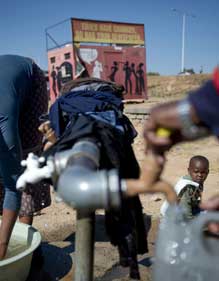
Depending on which way you look at it, the municipal audit report for the 2012/13 financial year offers either a positive or a miserable outlook for South Africa's local government landscape. The report was published last week by the auditor-general, Kimi Makwetu.
As Pravin Gordhan, the minister in charge of local government, said at its launch in Pretoria, the government had entered into some ambitious programmes over the past few years to turn around the performance of municipalities. But in so doing, it had failed to realise that a one-size-fits-all approach to governing municipal finances would not work.
Gordhan also offered some reprieve for local government, stating that "some of the hurdles that municipalities have to face are quite formidable, so there is some empathy for municipalities". Makwetu noted in his report that the number of improved audits for the 2012/13 period exceeded that of those that regressed. This in itself is a positive step, as the number of municipalities with disclaimer opinions went down. Makwetu said only 19 municipalities missed the deadline for the submission of audits, a significantly lower number than in the past.
"Out of the 319 audits completed, 22 municipalities and eight municipal entities achieved clean audits," he said in his statement supporting the report. "This constitutes an overall 9% as compared to the 5% obtained in 2012. And, amongst the 30 clean audits, 13 have sustained this achievement since 2011/12."
Those with clean audits demonstrated "impeccable levels of discipline and oversight in their financial management and operational activities".
The good and the bad of metros
Now to the not-so-good news. Of the country's eight metros, only the City of Cape Town got a clean audit. A clean audit is an unqualified audit without findings. Johannesburg metro also did better, moving up from a qualified opinion in the last audit to an unqualified one with findings. It was one of 138 municipalities that fell in this category, along with the other Gauteng metros, Tshwane and Ekurhuleni, as well as KwaZulu-Natal's eThekwini. The remaining three metros, Mangaung in Free State and Buffalo City and Nelson Mandela Bay in Eastern Cape, all received qualified opinions with findings.
At the release of last year's audit report, Corruption Watch said that a quarter of its then almost 800 complaints about local government involved metro municipalities. Nelson Mandela Bay had been singled out as in dire need of intervention from the national government. In his capacity at the time as finance minister, Gordhan appointed a task team to assist the coastal municipality turn around its financial management. "The region has seen a number of controversial incidents in recent months, including criminal charges being lodged against its mayor and deputy mayor by the DA," Corruption Watch reported at the time.
In this year's audit report, Nelson Mandela Bay recorded the highest figure in unauthorised, irregular or fruitless expenditure, at more than R2-billion. Most of this fell under irregular expenditure. According to Makwetu, 90% of municipalities had findings regarding compliance with laws and regulations, many of which related to supply chain management.
"Irregular expenditure was reported at 265 auditees (83%), mainly due to the lack of basic controls and inadequate implementation of appropriate consequences where there has been poor performance or transgressions," said the auditor-general. "The value of these controls cannot be emphasised enough as they are an important mechanism to narrow the space for widespread abuse of the public resources that are required to provide services to citizens."
Skills shortage
Another recurring problem he noted was the continued use of consultants for work that could be done by officials. Almost R700-million was spent by municipalities on the services of consultants during the year. Despite this steep sum, Makwetu's office had to return as much as 80% of initial financial statements as they were below the standard required.
"We have to ask tough questions about why these consultants get paid and what are they actually doing in municipalities," said Gordhan, adding that the practice undermined municipal financial performance rather than assisted it.
From a provincial point of view, Western Cape led with the number of municipalities with clean audits, with five retaining this score. KwaZulu-Natal also got a special mention by Makwetu for improved performance. "We commend the Western Cape and KwaZulu-Natal provinces for already tracking double digits in this category [clean audits]," said Makwetu. "They have also acknowledged that it is some way to go still to sustain and institutionalise these disciplines while they work hard to improve controls at other municipalities. So it is work in progress but shows good positive signs."
What Corruption Watch reporters say
From the perspective of Corruption Watch, which has been soliciting reports from members of the public since inception in early 2012, the state of local government has always been a cause for concern. Gauteng, KwaZulu-Natal and Mpumalanga lead the pack in terms of reports. As many as 813 reports of alleged corruption linked directly to municipalities have been made. Most of these cite procurement process irregularities that end up costing the taxpayer millions of rand every year.
Wasteful expenditure is a relatively common allegation among reporters, cited in 8% of the reports, with theft of government assets and abuse of position also featuring significantly. Nepotism, embezzlement of municipal funds and abuse of powerful positions by senior officials are common allegations.
Reporters often allege that supply chain processes are overlooked, as Makwetu also noted. This area of local government administration was a huge concern, said Gordhan. Working with the National Treasury, his Co-operative Governance and Traditional Affairs Ministry would investigate centralising the procurement of consultants for municipalities. "This [will ensure] that vetting [will take] place and the right people with the right qualifications are hired."

